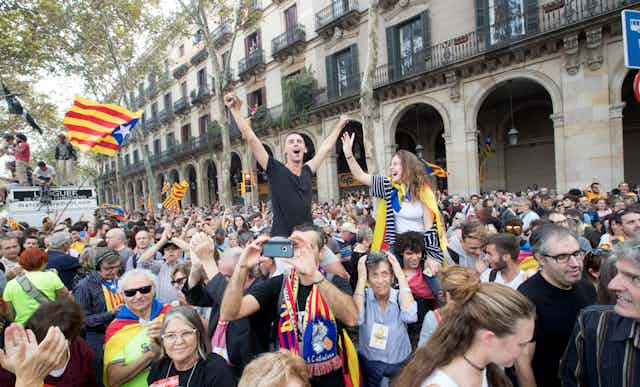Shortly after Catalonia’s parliament in Barcelona voted to declare independence from Spain on October 27, the senate in Madrid voted to trigger Article 155 of the Spanish constitution, removing Catalonia’s autonomy.
In his speech to the senate requesting that deputies approve the proposal, the Spanish prime minister Mariano Rajoy justified his request in the face of “a continuous process of anti-democratic decisions” in Catalonia.
One of the first measures required by Article 155 will be the sacking of the Catalan president, Carles Puigdemont, which would pave the way for Rajoy to call elections within six months.
Meanwhile, in the Catalan parliament, parliamentarians voted in secret on a proposal from the ruling coalition Junts Pel Sí (Together for Yes) and the far-left Candidatura d'Unitat Popular (CUP) to begin a constituent process in order to proclaim the independent Republic of Catalonia. The final vote in the 135-seat chamber was 70 deputies in favour, 10 against and two abstentions. Dozens of deputies from the opposition Catalan Popular Party, the Catalan Socialist party (PSC) and the Ciudadanos party abandoned the plenary session ahead of the vote.
In response to the Catalan parliament’s vote, Rajoy went on Twitter to ask all Spaniards for calm and to note that the rule of law would be restored in Catalonia.
The vote closed down the one conciliatory amendment which had been proposed by the Socialists in the Madrid senate to freeze the triggering of Article 155 if elections were called in Catalonia. Instead, the vote in favour of independence was seen as a slap in the face for dialogue.
There was little in the way of conciliation present in the senate. Various deputies from Rajoy’s Partido Popular (PP) jubilantly applauded parts of the premier’s speech in a manner that seemed overly triumphal and expressly designed to trample upon Catalan sentiment. Rajoy repeatedly criticised Puigdemont for appearing to turn down any offer of dialogue with the Spanish government. Puigdemont, on the other hand, had viewed the request to appear before the senate less as a desire for negotiation and more as an imposition.
What the people think
As the two elected assemblies went head-to-head, the rallying cry No nos representan “they don’t represent us” seems as relevant today as when it became the defining cry of the indignant movement, or 15-M movement, which erupted in Spain in 2011 in a challenge to the political status quo.
While the political elites in both Catalonia and Madrid have both been calling the shots, it is not clear what support they have behind them to do so. The Catalan referendum on October 1 was not an accurate representation of the support for a declaration of independence. At 42%, turnout was suppressed – in part because of a heavy police presence and the best efforts of the Spanish government to disrupt the vote. But also because only those in favour of independence were likely to turn out to vote.

Nor was there any time for a proper campaign before the referendum in which the arguments for and against independence could properly be aired and discussed.
There was barely a month between the Catalan parliament passing a law to approve the referendum and the vote itself. It is therefore hard to gauge either the level of public support for independence or the level of public understanding which might underpin such a move.
The most recent elections in both Catalonia and Spain are also an unreliable indicator of public sentiment on the independence question. Rather, they lay bare the divisions which exist in Catalonia and Spain on a whole variety of issues. The June 2016 general election – a re-run of December 2015’s election – reaffirmed the reluctance of voters to give any party an absolute majority. Although Rajoy’s PP strengthened its position with 33% of the vote and 137 seats, this was still short of the 176 seats needed for an absolute majority.
The picture is also fragmented in Catalonia where the ruling coalition Junts pel Sí fell short of an absolute majority in the 2015 elections. Gaining 62 seats with 39.6% of the vote, it was forced to form a minority government with the CUP lending confidence and supplying support. Together these separatist political formations garnered 44.3% of the popular vote.
In both Catalonia and across Spain, voters did not give any political party the mandate to govern with an absolute majority. This is a message that politicians should have heeded. It denotes an electorate which wants compromise and negotiation between parties rather than the adoption of maximalist positions by any single political formation.
In all political processes, choices are made at the mass level as well as the elite level. Elite figures should take their cue from voters and the behaviour of groups in civil society who in turn often adapt their behaviour and choices in light of the actions of elites.
The ability to find a negotiated solution to the crisis in Catalonia then depends on both the elites and the general population. While Catalan leaders obviously felt they were fulfilling their historic duty in the face of protesters calling for independence outside the Catalan parliament, those cheering the loudest should not be confused with the views of all in Catalonia.
Although already weary of voting, it is likely that the electorate could once again be called to the polls in Catalonia as one way out of this current impasse. It is time all of the people had their say.

